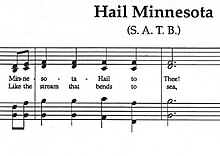
Miserere is a setting of Psalm 51 by Italian composer Gregorio Allegri. It was composed during the reign of Pope Urban VIII, probably during the 1630s, for the exclusive use of the Sistine Chapel during the Tenebrae services of Holy Week, and its mystique was increased by unwritten performance traditions and ornamentation. It is written for two choirs, of five and four voices respectively, singing alternately and joining to sing the ending in 9-part polyphony.
"On, Wisconsin!" is the fight song of the Wisconsin Badgers at the University of Wisconsin–Madison. A version with modified lyrics is the official state song of Wisconsin.
"Thanatopsis" is an early poem by the American poet William Cullen Bryant. Meaning 'a consideration of death', the word is derived from the Greek 'thanatos' (death) and 'opsis'.
"Hail, Pennsylvania!" is a song written by Edgar M. Dilley as a submission to a University of Pennsylvania alumni committee-sponsored contest to write a song to the tune of "God Save the Tsar!", the national anthem of Imperial Russia, by Alexei Fyodorovich Lvov. Dilley was awarded $25 for creating it. It served as the regional anthem of Pennsylvania until 1990 and now serves as the municipal anthem of Scranton, Pennsylvania.
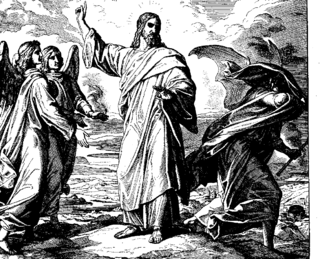
Matthew 4:10 is the tenth verse of the fourth chapter of the Gospel of Matthew in the New Testament. Jesus has rebuffed two earlier temptations by Satan. The devil has thus transported Jesus to the top of a great mountain and offered him control of the world to Jesus if he agrees to worship him. In this verse, Jesus rejects this temptation.

Psalm 89 is the 89th psalm of the Book of Psalms, beginning in English in the King James Version: "I will sing of the mercies of the LORD for ever". In the slightly different numbering system used in the Greek Septuagint and Latin Vulgate translations of the Bible, this psalm is Psalm 88. In Latin, it is known as "Misericordias Domini in aeternum cantabo". It is described as a maschil or "contemplation".
The "Minnesota Rouser" is the fight song of the University of Minnesota. It is played at all Minnesota Golden Gophers games.

Psalm 91 is the 91st psalm of the Book of Psalms, beginning in English in the King James Version: "He that dwelleth in the secret place of the most High shall abide under the shadow of the Almighty." In Latin, it is known as 'Qui habitat". As a psalm of protection, it is commonly invoked in times of hardship. Though no author is mentioned in the Hebrew text of this psalm, Jewish tradition ascribes it to Moses, with David compiling it in his Book of Psalms. The Septuagint translation attributes it to David.
"Minnesota Fight" is one of several school songs of the University of Minnesota. Responding to a 1925 contest to find an additional fight song for the school, university graduate Truman E. Rickard entered a piece entitled "Minnesota! Let's Go!". Rickard shared the contest's hundred-dollar prize with another entry, Marion Bassett's "Our Minnesota". Rickard's fight song can still be heard at Minnesota Golden Gopher athletic events, but is now known as "Minnesota Fight".

The "Penn State Alma Mater" is the official alma mater of The Pennsylvania State University. The song was accepted by the university in 1901.

Cyrus Northrop was an American university president.

Vivas Schola Regia, officially Scholae Regiae Edinensis Carmen, is the song of the Royal High School. The Latin lyrics were written by the Rector, Dr. John Marshall, in 1895, and set to music by Sir Alexander Mackenzie, a former pupil of the school. James Trotter comments on Marshall's character and influence: 'The spirit which inspired him is well exhibited in his "Song of the High School."'

The alma mater of the University of Pittsburgh was adopted soon after the University changed its name in 1908 from the Western University of Pennsylvania to its current moniker. Lyrics were written by George M. P. Baird, class of 1909 and were set to the tune of what was then the Austrian National Anthem. A new tune for the "Alma Mater" hymn was composed by Charles W. Scovel, class of 1883, but it was not widely adopted and was either lost or became obscure.
Coronation Ode, Op. 44 is a work composed by Edward Elgar for soprano, alto, tenor and bass soloists, chorus and orchestra, with words by A. C. Benson.
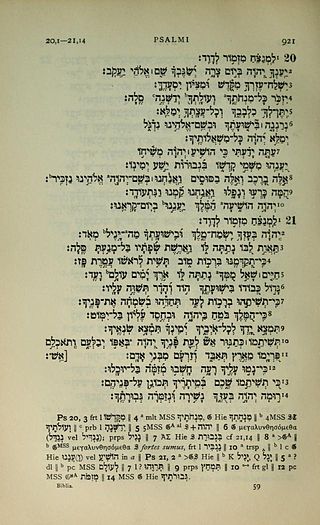
Psalm 21 is the 21st psalm of the Book of Psalms, beginning in English in the King James Version: "The king shall joy in thy strength". The Book of Psalms is part of the third section of the Hebrew Bible, and a book of the Christian Old Testament. In the slightly different numbering system used in the Greek Septuagint and Latin Vulgate translations of the Bible, this psalm is Psalm 20. In Latin, it is known by the incipit, "Domine in virtute tua". The psalm is attributed to David.

Psalm 50, a Psalm of Asaph, is the 50th psalm from the Book of Psalms in the Bible, beginning in English in the King James Version: "The mighty God, even the LORD, hath spoken, and called the earth from the rising of the sun unto the going down thereof." In the slightly different numbering system used in the Greek Septuagint and Latin Vulgate translations of the Bible, this psalm is Psalm 49. The opening words in Latin are Deus deorum, Dominus, locutus est / et vocavit terram a solis ortu usque ad occasum. The psalm is a prophetic imagining of God's judgment on the Israelites.
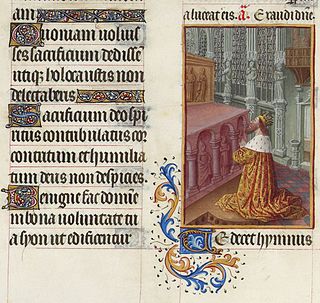
Psalm 65 is the 65th psalm of the Book of Psalms, beginning in English in the King James Version: "Praise waiteth for thee, O God, in Sion: and unto thee shall the vow be performed". In the slightly different numbering system of the Greek Septuagint version of the Bible and the Latin Vulgate, this psalm is Psalm 64. In Latin, it is known as "Te decet hymnus Deus in Sion et tibi reddetur votum in Hierusalem".

Psalm 71 is the 71st psalm of the Book of Psalms, beginning in English in the King James Version: "In thee, O LORD, do I put my trust: let me never be put to confusion". It has no title in the Hebrew version. In the slightly different numbering system used in the Greek Septuagint and Latin Vulgate translations of the Bible, this psalm is Psalm 70. In Latin, it is known as "In te Domine speravi".

Psalm 102 is the 102nd psalm of the Book of Psalms, beginning in English in the King James Version: "Hear my prayer, O LORD, and let my cry come unto thee." In Latin, it is known as "Domine exaudi orationem meam".
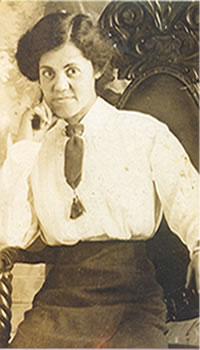
"Dear A&T" is the school song of North Carolina Agricultural and Technical State University. The words were written by Susan B. Dudley, wife of the second president, James Benson Dudley. Music for the poem was composed by Charles E. Stewart, director of instrumental and vocal music at the university from 1909 to 1917.
